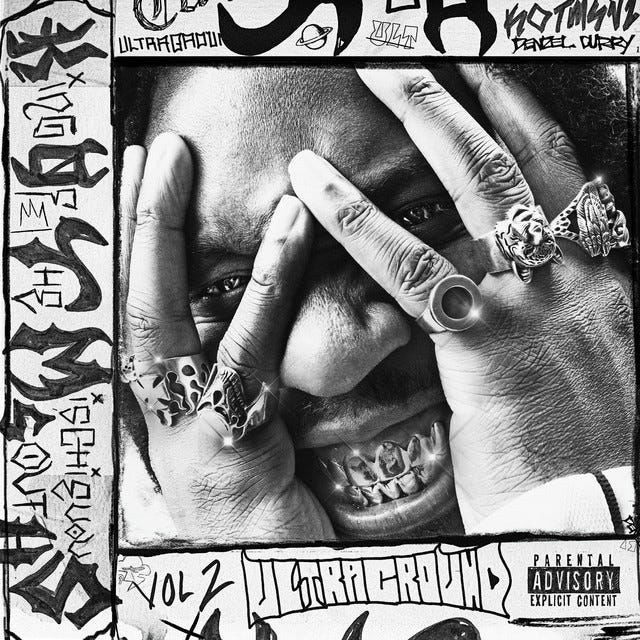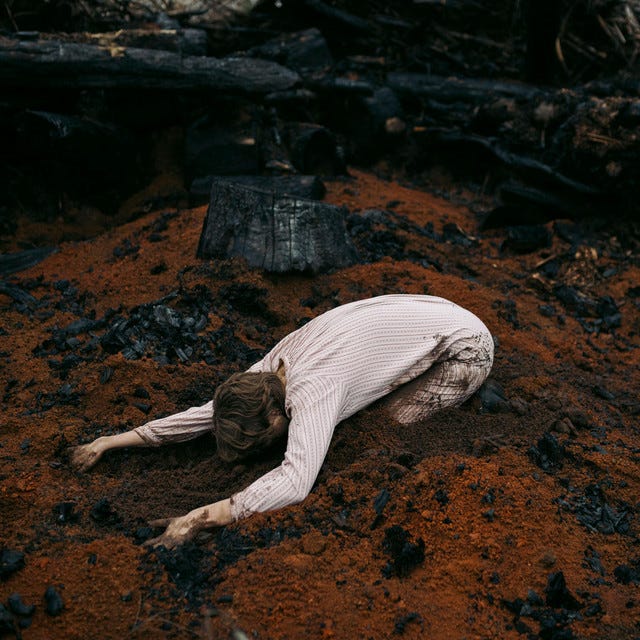The Best Albums of 2024
The year where the impending country recurrence finally opened up completely and everyone was forced to talk about it.
Country has always been over-represented in my personal listening habits, mostly out of close personal interest and somewhat out of familiar convention, but the recent inescapable turn toward the genre has forced me to exercise a kind of attention and criticality in a way I’ve not explored in some time, which feels like something of a happy accident, even as the genre’s eruption back into the popular mainstream was loudly bubbling up over the past several years. And while I have a lot of opinions on this, instead of adding to the repetitive drone of think piece speculation on how pop went country this year, I have incorporated some of my takes on these events into a list of my favorite albums released in 2024, a year in which most of my listening time was occupied by a small and closely curated selection of Disney musicals (I have a small child). While compiling this list, I was mostly struck with the ways I managed to become exposed to a solid breadth of very good records considering my new full-time mandatory commitment to Idina Menzel and Kristen Bell, a fact that has made this a more laborious process than I first anticipated when my good friend and colleague invited me to join him in putting together some writing about the music we liked this year. And with its usual providential flair, our institution of an anarcho-dibs based system for selecting our favorites has worked perfectly, which means that while I won’t be talking about Chat Pile, Godspeed You! Black Emperor, or Waxahatchee, you can find excellent summations of their music here, in trusted hands. Did this split in territory contribute to the plurality of country on this list? Maybe, but it could have been worse, and it wouldn’t explain all the ones that could have just as easily found themselves here. As has been the case for some time, and like with most other genres, there’s a lot of good country music out there, even if you have to squint a little bit to find it in some years. This, for the record, was not one of those years.
I promise the following is not completely consumed by 2024's loudest musical cultural discourse, something only the real pros have the time for (if you're willing to enlist me in your ranks please email me). I've provided a smattering of other stuff around this list’s plurality of country and hope some of it might make a positive contribution to your playlists and overall musical habits.
Here they are, in order.
Kaitlin Butts - Roadrunner!
One might ask, given its range of contexts, why shouldn’t Roadrunner! work? I’ve seen the occasional skepticism pointed at its concept — inspired by Rogers and Hammerstein’s Oklahoma! — but in this, the year of the Midwest Princess (did you see SNL?), the motif hits a particular tenor so perfectly that one can officially file Butts into the category of criminally underrated country performers. What makes Butts standout among her peers is a playful intent and attitude regarding the pageantry and theatricality of so-called “flyover country,” grounded in a particular historicized imagination of culture that avoids the more contemporary expression of extreme anxiety that characterizes depictions of Middle America, the frontier fear that permanently lies within the national amygdala. Roadrunner! is, by contrast, mercifully exuberant, both fun and funny enough to elevate its romantic sentimentality rather than collapsing under the mid-century saccharine that inspired it. “People Will Say We’re in Love” was practically ready-made for country balladic adaptation, and thankfully Kaitlin Butts was smart enough to put it to wax. Recommend listening with a healthy serving of Wild Juanita’s Cactus Juice.
Kim Gordon - The Collective
There is a trope of nonchalance as cover for anxious self-consciousness, but if Kim Gordon is afflicted by this in a truly meaningful way it would be impossible to tell. There is a relief felt when the extremely cool person is found to be deeply and anxiously insecure — it’s a trope we come by honestly — but I highly doubt even a fraction of this would negate the impact of Gordon’s latest kool thing, a perfect reminder of everything we’ve always known about her, even after the publication of a memoir just a decade ago. In many ways, The Collective explores the register most reminiscent of her work with Sonic Youth more than any of her other non-Youth project to date, and it does so by weaving together a series of casual observations, oblique phrasings, and physical objects around a collection of beats originally intended for the Opium label’s founder and acolytes. The results are not just an interesting sonic expansion of the motifs found in part on No Home Record, but also the strengthening of a style first dreamt up over forty years ago, a form of artistic resonance that has long solidified Kim Gordon’s place among the highest reaches of the American punk avant-garde. It works not as a return to form, but as form’s confrontational persistence and reassertion, and the appeal of Gordon's artistic nonchalance is still otherworldly.
Lip Critic - Hex Dealer
People are always making abrasive music, if only so much of it weren’t dreadfully tedious. My problem with the 2000s dance-punk/electroclash revival is not its proximity to emotionally bankrupt right wing hipsters, but the way its synthetic expression of corrosive sound is grounded in a deeply referential attitude that falsely portends to a revolutionary turn, instead desperately mashing together the soundtrack of contemporary political anxieties of the upwardly mobile with attempts to capture that feeling of taking mushrooms and seeing Crystal Castles at Bonnaroo in 2008. It's just about the least punk thing I can think of outside of the cryptocurrency market, yet the denizens of bad theater have decided to do both anyway, and I’m bored. True punk sneers back at attempts to punish its own reference, and while its appropriation and commodification is just as available as any other way of making music, it can wield the power of absurdity in ways those rehashing various flashes in the pan can only imagine. Lip Critic continue to make music that sounds as much like a collapse of forms as the establishment of a new one, and Hex Dealer is a welcome reminder of a certain register in punk’s defiant persistence. It’s a sonic representation of getting yelled at about MK-Ultra and the baby eating pedophiles from a random person pumping gas at the Wawa while you're trying to inflate your tires for free, and it’s also the perfect discordant attitude I would like to carry into 2025.
Johnny Blue Skies - Passage Du Desir
“Who the fuck is Johnny Blue Skies?” It’s both a good question and also a t-shirt sold in the official Johnny Blue Skies merch store, which you can find at SturgillSimpson.com. Simpson has described the new moniker as an attempt to reclaim a sense of personal identity (“I kind of wanted my name back for myself”), which even an obscure culture writer (read: me) can understand considering the largely glowing reception of his music over the past eleven years. And while it’s easy to welcome this satisfying narrative sea change (please keep me guessing), it does raise some interesting, if not all that important follow up questions. Mainly: is there a real difference between Simpson and Blue Skies? Disregarding the double billing, shared website, or mutual performance and production credits on Blue Skies’ debut Passage Du Desir, it seems like they’ve lived similar lives, if the music has anything to say about it. Both offer narratively and instrumentally cohesive blends of storytelling and confession in ways that feel both historically grounded and refreshing and both write better songs than their peers, whoever they might be. It appears Simpson and Blue Skies are destined to be burdened by one another — two competing characters possessing the same body and collective history in ways that disrupt assumption about causality that I find appealing. Passage Du Desir, as fully realized and triumphant as any Simpson release, offers an important entrant into the new Simpson/Blue Skies debate — one that kills the desire to pick apart their differences. Obligatory mention of my unholy obsession with the guitar solo in “One For The Road.”
Denzel Curry - King of the Mischievous South vol. 2
“Soundcloud rap” was maybe once a distinct form in hip hop, but its stylistic trademarks — overdriven bass, lo-fi and borderline raw production, a delivery that coined the pejorative “mumblerap” — have been either discarded or absorbed at this point in the form's history. And perhaps despite, rather than because of this, the era did a lot for South Florida’s new turn (and occasional dominance) in contemporary rap by elevating performers that certainly wouldn’t have languished in obscurity if things went differently, but who would maybe not have obtained the reach they've experienced both in past and present, for better and certainly for worse. It’s an organically amorphous rise (and fall) of a particular style in some ways, though I still believe the Raider Klan deserve any attention they've maybe received in contemporary reflections on the last decade in rap. The satisfying narrative arc that grew the Raider Klan from a Miami Gardens-based local crew to one that incorporated artists from different states (granting us the best use of a Final Fantasy sample in the process) felt exciting to experience in real time, and I’ll always be grateful for what this likely did for Denzel Curry’s early career, though his talent is more to blame for his rise. Still, history is our friend in music criticism, and Curry’s double mixtape is just the latest mile marker in a career that has placed itself on a seemingly endless straightaway with zero intent of slowing down. His clever and exciting delivery has always stood out amongst his peers, but perhaps underrated is Curry’s ability to maintain a level of natural energy that joyously remains a fixture of his sound (the first volume released in 2012), an evolution of the quality that made the best of so-called soundcloud rap appealing. There were many in the running for Song of the Summer (TM), that’s true every year, but King of the Mischievous South Vol. 2’s lead single is my own personal dark horse pick — a nasty Three 6 type beat that delivered easily the best feature of 2024 from one of rap’s most endearing rising stars. It’s a perfect summary of what Denzel Curry can still do.
Post Malone - F-1 Trillion
There are plenty of problematics when you make a point of choosing the country crossover record in a year where everyone is crossing over, but the decision became clear pretty quickly, and I’ll be the first to admit some surprise. It’s not that Postie didn’t have a country record in him — his country-karaoke live performances that auditioned him for the part showed it could work in some capacity — but I was somewhere close to shock at the clarity and scope of his first real shot at the genre, represented by the image of a 1971 Ford pickup impossibly balanced on its nose midair over undisturbed water, capturing the exact moment right before a huge splash. It may be cynical to admit, but never underestimate the power of a well-constructed committee, and since I’ve no prejudice against the concept of crossing over into country (maybe due to a lack of purity or an amateurish fealty to country rock), I knew there was always a chance he was going to pull it off, and he did.
Despite any larger misgivings with the trend (I am, for the record, not staking a totally apologetic position with regard to the turn toward country, but I've pushed my word count enough as it is), all of this is still an improvement over the standards set by the general state of country radio, which deserves a decent amount of the skepticism it receives on a regular basis, though this can sometimes be boiled down to a lack of understanding as much as a lack of appreciation. We’ve heard a lot about the death of bro country and year after year terrible singles with dated trap beats manage to play on the radio for unthinkable stretches of time for any other genre of popular music, singles that often overshadow the actually interesting ones from the same artists. Terrible interpolation has grown to occupy a similar role of an obnoxious and relentless trend, yet I still think it unfair to fold these tendencies into the entirety of the country radio clump playing loudly over the dozens of televisions blasting blue light at my face in my central Florida sports bar of choice. But to be completely honest, if I’m picking public drinking music in 2024, I’m putting on F-1 Trillion. If this represents an embrace of lower stakes, so be it. There’s an honesty ready for observation in the pristine fabricated construction, and Post’s foray into country dropped the wrecking ball and built the building in one go by pumping out hits with features that make their guests sound better than they have in years. Post Malone and company not only made the best pop country record of the year — they’ve capture the contemporary zeitgeist by all-but ensuring its next big thing.
Dallas did drop a lot of games this year.
Infant Island - Obsidian Wreath
Screamo never left us, it simply moved beyond itself in a sublative process of alteration and change. The frequently misunderstood subgenre has gone through some change over the past twenty years, though much of this can be attributed to the casual use of the term. Everyone has been trapped by someone at a party over-explaining the descriptive misuse of screamo, so I'll spare us all the lecture, but what is certain is that the heavy music world has continued to move past the term’s most familiar signifiers in mostly positive ways. The more concrete tributes to bands like Orchid and Pg.99 are maybe dime a dozen, but they’re certainly enough to carry interest in the subgenre further forward in time, and younger musicians and listeners are encountering these sounds through punk's own trademark obsession with cultural recurrence aided by the algorithmic specificity of social media, but what is special about screamo’s history is how those who have worked to blend out its influence are most deserving of its legacy. What can be described as screamo, or at least those contemporary artists most worth exploring, have worked to incorporate its key musical elements into new ways of thinking. Infant Island’s Obsidian Wreath is the latest best example of this process of positive change.
The first note of Infant Island’s music I heard was performed live (on their fairly recent tour with Liturgy), and this felt like a proper, if not serendipitous, way to begin experiencing their work. It’s a reminder of not just the ways live music can overwhelm you with intensity despite your overexposed, aging, desensitized musical sensibilities, but also of the intimate and unique connection between the performing and recording of heavy music that’s produced stories of organic and spontaneous musical discovery and exposure for decades. The capacity for heavy music to move you is its most underrated feature, and this is what Infant Island has done, with Obsidian Wreath the latest high watermark in a series of albums and EPs that I only regret not having heard sooner. Their active contention with the hopelessness of our contemporary moment is drawn in atmospheric terms, the perfect environment for the exploration of how a beautiful, horrible alternative might feel. It’s a sound that deserves the highest complimentary cliche: you need to hear it live.
Hannah Frances - Keeper of the Shepherd
I will never recover from the Great Robbery of 2010, where in St. Petersburg, Florida, as I slept on the floor of a friend who had conscripted me for an evening to play guitar in his pretty good country band to a mostly empty bar, removed from my truck were my greatest loves at the time: my guitar (an American Telecaster, the one with the humbuckers), amp (a tweed reissue of the Fender Hot Rod Deluxe), and my perfectly crafted pedal board I built over years of service industry wages and instant ramen consumption. I never got any of this gear back and I am absolutely certain that my progress as a guitar player was permanently changed for the worse that day. And to make things even more grim, as I quickly age into someone who used to play music, guitars are back, apparently? I promise I’m not bitter.
The guitar is an incredible instrument, which is an easy thing to forget when you’re so intimately familiar with its ubiquity, taking the tear-inducing resonances of this collection of wood and metal and nylon and glue and making it regular and mundane. And despite the aforementioned unsatisfying cosmic circumstances that devilishly lowered the number of guitars present in my life, my favorite record of the year is still so often correspondent with my greatest happy envies, and there are none greater than the performances on Keeper of the Shepherd, an album filled with the evidence of folk’s brilliant marriage between the rhythmically utilitarian and ethereal beauty that elevates the natural dissonance of vibrating strings played through amplification to their deserved status of perfect accompaniment. Frances grounds her model singing voice with an almost clawhammer style mix of light strumming and fingerpicking — placing notes together in rhythmic fragments and adhering them into a record as rich and vibrant as cathedral stained glass, the peak of ethereal beauty. She is rightfully known as a vocalist, but Keeper of the Shepherd is in so many ways the purest distillation of guitar playing as craft — an instrument as useful for play as precision, abstract beauty as mechanical exercise.
This fracture-as-form philosophy only serves KOTS's lyrical reflections, stories that float atop the instrumentation as it naturally laps and ripples and rises and falls and lies still just as you hope it will. The title song’s unrelenting pacing is punctuated by choral eruptions that fall apart so perfectly you can almost hear the sound of screws loosening, as Frances and her band go barreling toward collapse while she meditates on various versions of the phrase “I cannot without me,” an expression of grief that chooses to explore the times we are put back together after coming undone at our seams. Frances captures and displays vulnerability by arranging a sonic expression of its most intimate feelings, and in doing so has produced this year’s finest song crafting and a record that moved me deeply.












